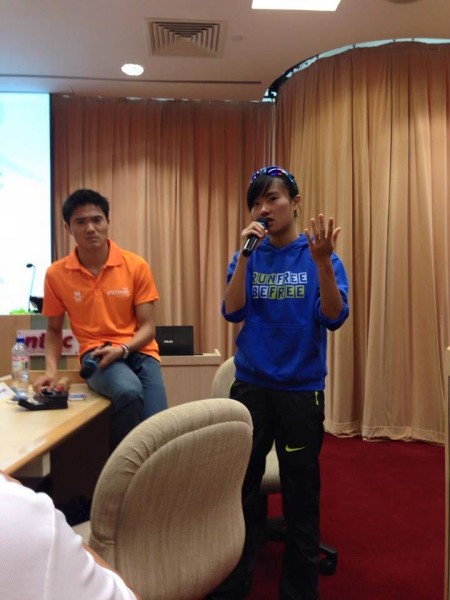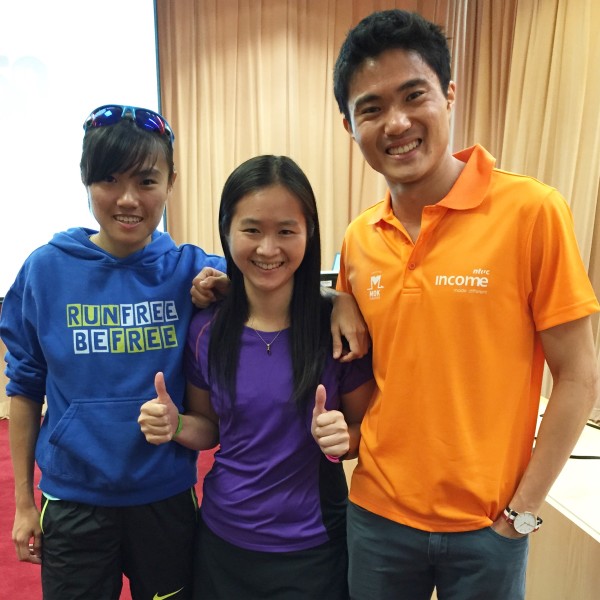Last Saturday, the final running clinic was held to prepare runners for the NTUC Income RUN350 race, on 5 April. The speakers at this clinic were the 2013 SEA Games 2013 Marathon winner, Mok Ying Ren, a medical doctor, and his younger sister, Mok Ying Rong, who works as a sports physiotherapist at the National Sports Institute – and has several podium finishes in local races.
At the talk, the two siblings shared insights into what are the most common running injuries – and how to prevent these from occurring and nipping them into the bud – before they actually develop into full-blown injuries. Here are some of the main highlights of the talk.
According to Dr Mok, about 85 per cent of runners, regardless of whether they are elites or professionals, often sustain serious and crippling injuries during their running “career.” Even the doctor himself has sustained some rather bad injuries that have kept him out of running for months.
But he added that certain factors will increase the chances of sustaining a running injury. These include both intrinsic and extrinsic factors. Intrinsic ones refer to body dysfunctions such as weak and underused muscles that are not working to their full capacity. Extrinsic factors stem from the outside environment, such as incorrect shoe choices, wearing wrong insoles and if you are increasing your running mileage too fast.
The Common Running Injuries and what causes them
The most common injuries for runners are usually in the knees, followed by the foot and then the ankles, according to Dr Mok. Some of these are:
Patellar Femoral Pain Syndrome (PFPS)
This is characterised by pain or discomfort that comes from the contact of the posterior surface of the patella (back of kneecap) with the femur (thigh bone). It is usually marked by a very stiff and sore knee, and knee pains when walking up the stairs.
According to Miss Mok, this type of injury is usually caused by weak hip adductor and gluteal muscles. These are the muscles which make up the buttock.
Shin Splints
Dr Mok said that this is typically characterised by pain along the tibia – the largest bone in the front of your lower leg and they often take several months to heal in runners.
Like in PFPS, this type of injury is also caused by weak hip adductor and gluteal muscles.
Iliotibial Band Syndrome (ITBS)
This injury happens when the iliotibial band – the ligament that runs down the outside of the thigh from the hip to the shin – becomes tight or inflamed, and it can sideline a runner for weeks, or even months.
It usually happens in runners who have weak hip adductor muscles, according to Miss Mok. These are the muscles that range from the range from the lower pelvic bone to the femur and knee region in the human body.
Achilles Tendonitis
Dr Mok explained that this injury is caused when the tendon connecting the back to your leg to your heel becomes very swollen and painful near the bottom of your foot. This is characterised by a stiff and painful heel in the mornings and the tendon feeling very painful and warm when it is touched or moved.
Runners who have weak plantar flexion are usually susceptible to this type of injury. Platter flexion is the movement of the foot that flexes the foot or toes downward toward the sole.
Plantar Fasciitis (PF)
This injury is caused when the Plantar Fascia – a thick band of tissue that runs across the bottom of your foot and connecting your heel bone to your toes – becomes inflamed. It is characterised by a sharp and sudden stabbing pain when getting to a standing position, or after long periods of standing.
It is the result of having weak calf muscles according to the physiotherapist.
Strengthening Of Weak Muscles
The following are some exercises that will help you to strengthen certain weak muscles, according to Miss Mok. However, she added that if you are already injured, it is not advisable to do these exercises till you have recovered – and stressed that if you ever feel unnatural pain while doing them, stop immediately.
Hip adductor muscles
To strengthen your hip adductor muscles, Miss Mok recommends the following exercise. (See video).
“This action is called hip adduction and so naturally, the hip adductors (a group of muscles on the thigh that are crucial for the movement of the legs) are supposed to do the job. If you cannot activate the muscle well, try using visualisation. If the left hip adductor, for example, is not working, you may not be able to adduct it properly. The hip adductors are supposed to support your hips when you are running but it takes time, if you are not used to using the muscles,” the physiotherapist explained.
Calf Muscles
Strengthening your calf muscles will go a long way to helping out with PF, according to Miss Mok. Even if you have already sustained PF, strengthening these muscles will help it to recover within six months. Some exercises to achieve this, will include single leg calf raises and unilateral calf raises (See video).
Intrinsic Foot Muscles
When we are running, the foot is the part of the body that virtually takes all of the impact, yet it is so ironic that we never look at the foot. While people foam roll their hamstrings, nobody ever foam rolls the foot simply because they are never told to do so. But once you start exercising the foot muscles, it will help you to become a more stable runner and prevent over-compensation.
Here are some exercises on how to strengthen the foot muscles. (See video).



Hi Pris,
I stumbled upon your blog when I searched for Mok siblings’ information. This article covered the talk with great depth. Thank you for sharing. I was behind you that day. I also shared my experience on the clinics and have linked up with your post. See you next time. : )
Angie
Thanks! The talk was really informative and interesting too – so just wanted to share it with other runners. See you!